OUR INOCULANTS
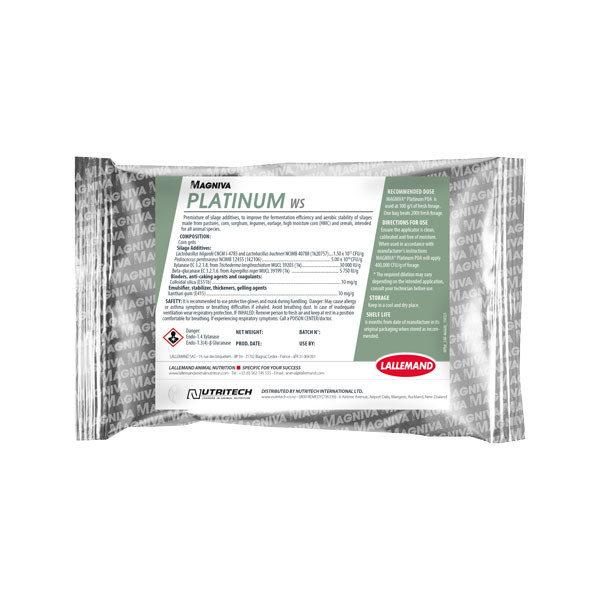
MAGNIVA PLATINUM WS
WHAT IT DELIVERS
MAGNIVA Classic is a forage inoculant specially designed to drive the rapid fermentation and preservation of all forage types. It is especially suitable for low dry matter (DM) forages – which are often lower in sugar content – requiring a quick and efficient fermentation. It delivers silage with more retained dry matter and higher nutritional value.
HOW IT WORKS
- ignificantly reduce heating
- Preserve silage quicker
- Increase digestibility
- Reduce dry matter losses.
Silage treated with MAGNIVA® Platinum is cooler and more stable after just 15 days.
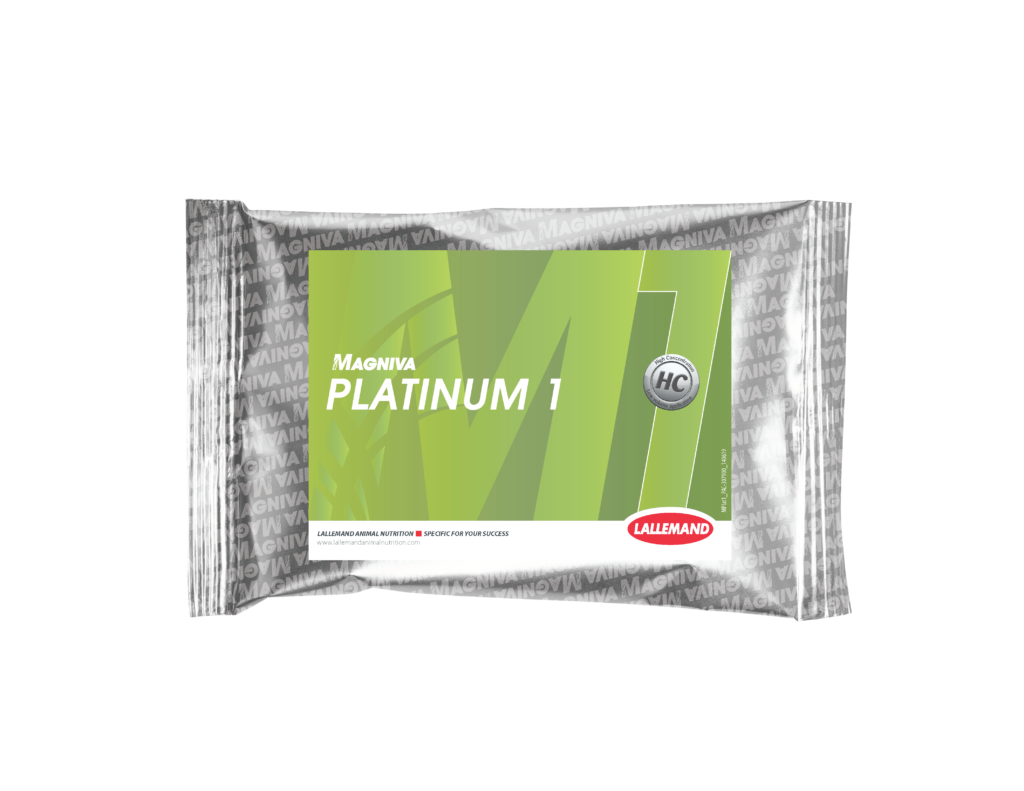
MAGNIVA PLATINUM 1
is a forage inoculant specially designed for maize silage above 30% dry matter with high sugar levels and aerobic stability challenges with feedout flexibility after 15 days.
HOW IT WORKS
The unique combination of Lentilactobacillus hilgardii CNCM I-4785 and Lentilactobacillus buchneri NCIMB 40788 in MAGNIVA Platinum 1 provide a fresh approach to forage management for crops such as wholecrop maize helping to prevent heating and spoilage.
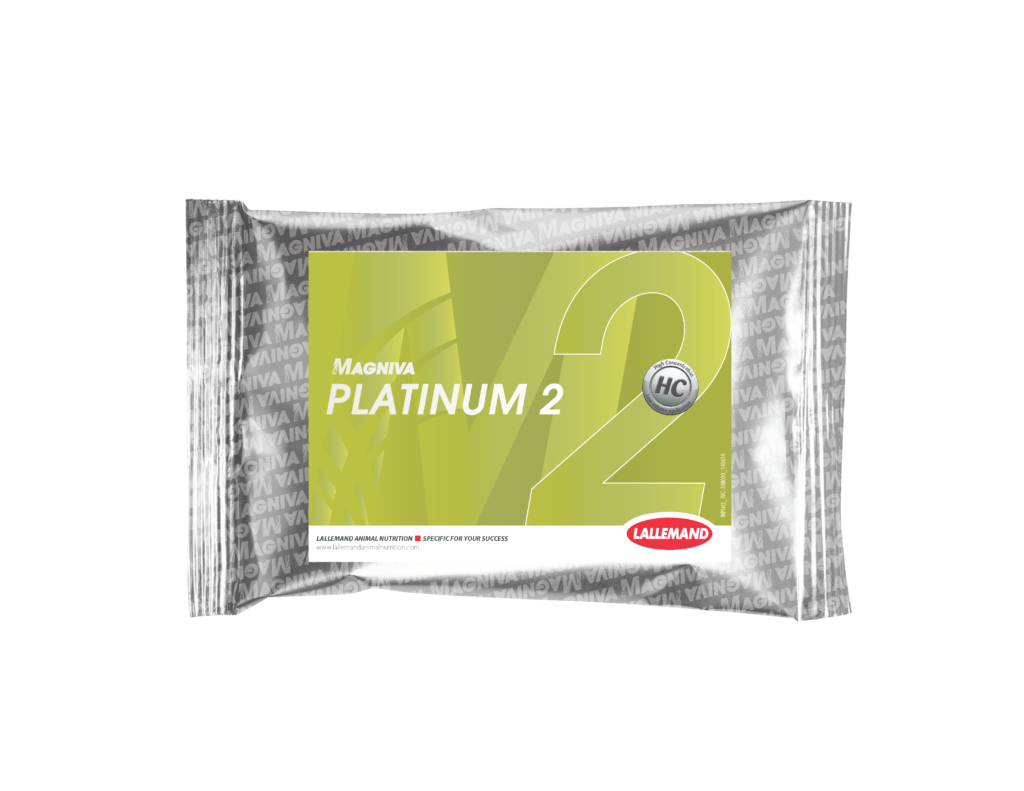
MAGNIVA PLATINUM 2
is a forage inoculant specially designed for high-moisture corn or grass silage above 30% dry matter with high sugar levels and aerobic stability challenges with feedout flexibility after 15 days.
HOW IT WORKS
The unique combination of Lentilactobacillus hilgardii CNCM I-4785, Lentilactobacillus buchneri NCIMB 40788 in MAGNIVA Platinum 2 – that’s two bacteria technologies – provide a fresh approach to forage management for crops such as high-moisture corn and sugar-rich grasses – helping to preserve silage quicker and prevent heating and spoilage.
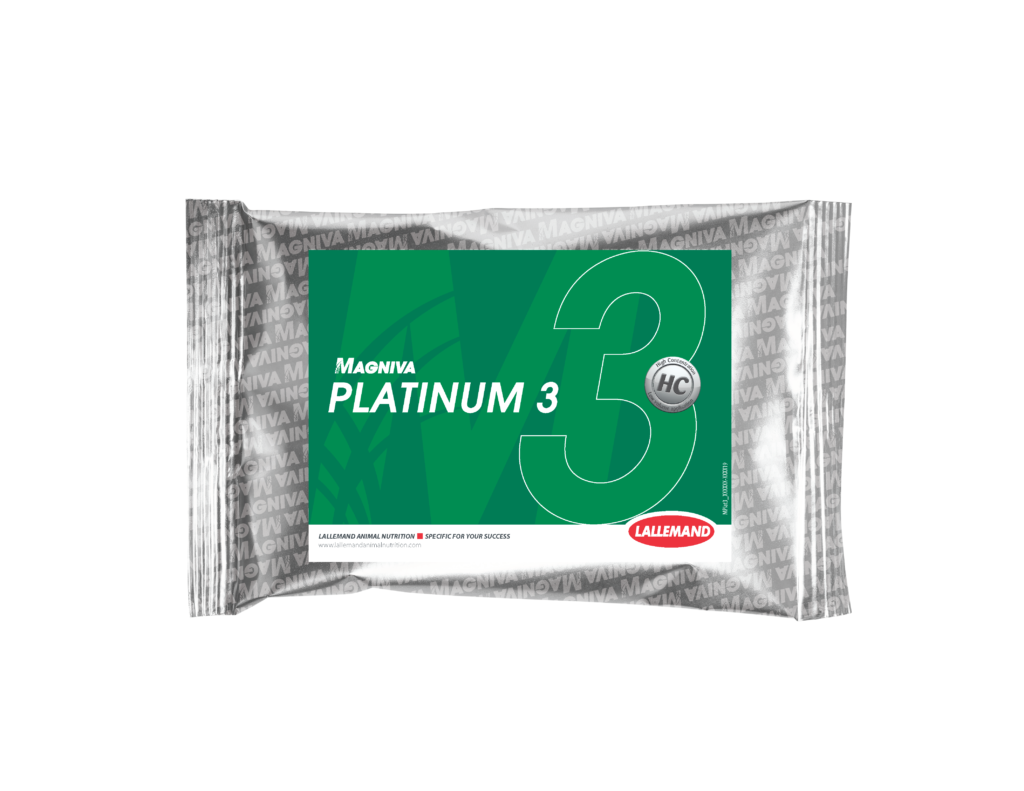
MAGNIVA PLATINUM 3
is a forage inoculant specially designed for grasses and legume above 30% dry matter with high sugar levels and aerobic stability challenges with feedout flexibility after 15 days.
HOW IT WORKS
The unique combination of Lentilactobacillus hilgardii CNCM I-4785, Lentilactobacillus buchneri NCIMB 40788 that’s two bacteria technologies plus enzymes – provides a fresh approach to forage management for crops such as grasses and legumes – helping to preserve silage quicker, prevent heating and spoilage, and increase digestibility.
TAKE CONTROL
Silage is the No. 1 feed component on most dairy operations – and it is of growing importance for beef cattle. Homegrown forage is an excellent source of protein and energy.

But the true benefits of silage are only available if it is of the highest possible quality. Simply put, MAGNIVA Silage Inoculants are designed to solve the operational challenges of producing and preserving quality silage. Our patented, unique bacterial formulations are produced in our facilities to safeguard product integrity.
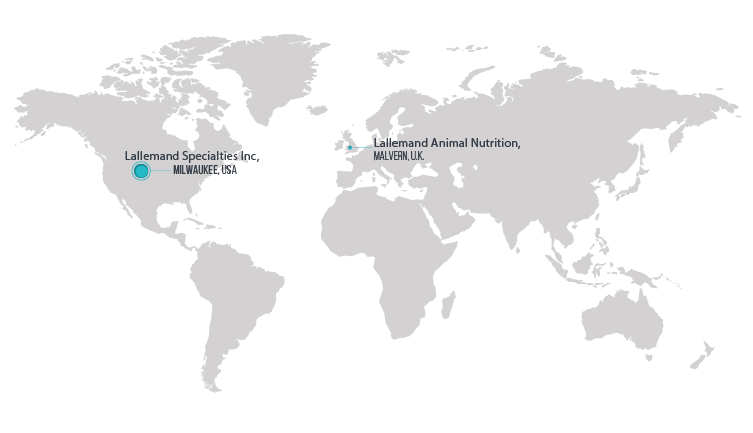
And MAGNIVA Silage Inoculants go through strict quality control tests to ensure bacterial quality and viability. Finally, each MAGNIVA solution is rigorously checked through independent global research and development testing to ensure it helps to deliver the best possible silage for your operation and herd.
HOW YOU WIN?
MAGNIVA Forage Inoculants are designed to ensure silages are quickly preserved to maintain nutrient and energy levels and reduce dry matter losses. Doing so means you will have more silage of better quality, which helps control costs.
BETTER FERMENTATION = MORE NUTRIENTS AND ENERGY
The specialized bacteria in MAGNIVA Silage Inoculants enhance fermentation by rapidly reducing pH. This helps to preserve as much of the original nutrient and energy content as possible – ensuring it is available at feedout.
Why it matters: Reduced undesirable bacteria
Reduced undesirable bacteria, retained nutrient and energy levels, better quality silage to feed.
REDUCED SILAGE LOSSES. MORE SILAGE TO FEED
A poor fermentation not only means the silage will be of lower quality, there will be less of it to feed. Losses of over 15% of the bunker/silo are not uncommon, which puts pressure on feed stocks and can add additional cost if the silage lost needs to be replaced by purchased feeds.
MAGNIVA Forage Inoculants ensure a quick silage preservation, in turn this inhibits undesirable bacteria, which are responsible for increased DM losses from growing in the silage, thus ensuring reduced losses.
Why it matters: Reduced dry matter loss

LESS MOLD AND YEAST AT OPENING = HIGHER FEED QUALITY AND BETTER PALATABILITY
Many silages – especially those with higher energy content and dry matter – are very prone to spoilage when opened. This is illustrated by silage heating and visual decreases in quality due to yeast and mold growth. These challenges can lead to significant losses of silage quantity and quality to the point where silage is rejected by the animals.
Why it matters: Aerobic stability
Better aerobic stability means:
- Greater management flexibility
- Reduced mold and yeast growth
- Reduced heating
- Improved feed quality and palatability
- Significantly less waste
- More silage of higher quality to feed
Not all products are available in all markets nor are all claims allowed in all regions.
MAGNIVA Platinum vs control corn silage
Discover a visual presentation of MAGNIVA Platinum effect on aerobic stability of corn silage vs untreated corn silage. You can see that after 7 days exposure to air we have no visible signs of spoilage on MAGNIVA treated silage, while untreated silage starts to develop mold.


